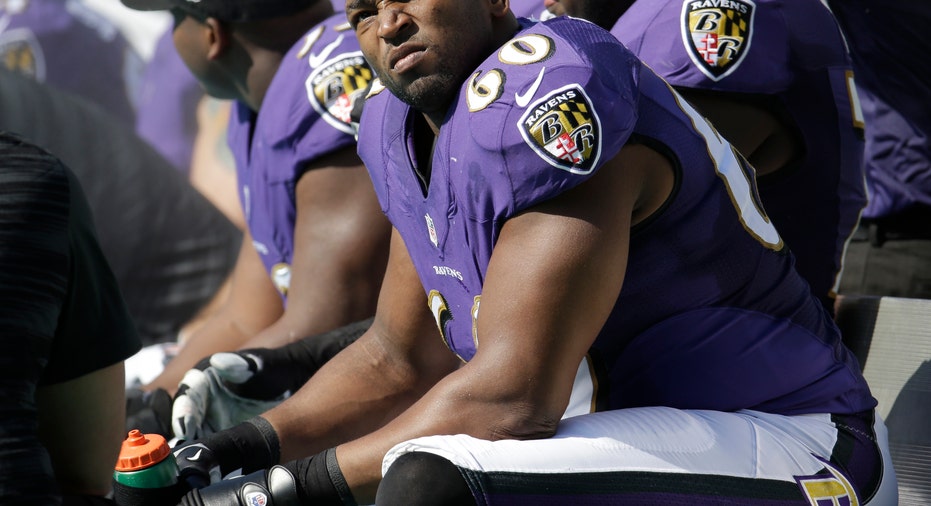Eugene Monroe on NFL Painkiller Allegations: 'I Can't Say I'm Surprised'

Eugene Monroe, the former NFL offensive lineman turned outspoken critic of league policies on prescription painkiller use, told FOX Business Tuesday that leaked court filings accusing team officials of misusing prescription drugs included details that were “staggering” – but not unexpected.
A lawsuit filed on behalf of more than 1,800 former NFL players – details of which leaked to the Washington Post last week – alleges employees of the league’s 32 franchises handled and prescribed prescription painkillers via methods that violated federal law. Citing leaked memos, the plaintiffs allege the average NFL team prescribed nearly 5,777 doses of anti-inflammatory medication and 2,213 doses of other controlled medication in 2012 alone, the Washington Post reported.
“While these numbers are staggering, I can’t say that I’m surprised,” Monroe said in an interview with FOX Business. “During my time in the NFL, my teammates and I were prescribed a myriad of painkillers and anti-inflammatory drugs at a rate I found to be alarming. Retired NFL players misuse prescription painkillers at a rate more than four times that of the general population.”
Monroe was released by the Baltimore Ravens last July. In the months prior to his release, he became one of the first active players to publicly pushing for the legalization of medical marijuana as a healthier alternative to addictive painkillers. Now retired from the NFL, Monroe says details of the lawsuit are reminiscent of situations he encountered during seven seasons as a member of the Ravens and Jacksonville Jaguars.
A 2011 survey of 644 former NFL players – considered to be one of the most thorough of its kind – found more than 70% of respondents admitted to some level of misuse involving painkillers.
Monroe, who battled concussions and other lingering injuries throughout the latter half of his career, said there is “constant pressure” on injured players to return to the game. He is particularly critical of the league’s use of Toradol, a powerful painkiller discussed at length in the court documents. Monroe described the effects of Toradol and other opioids in a May 2016 essay for the “Players Tribune.”
“I believe there is a culture in the NFL that implies it is okay for doctors to prescribe and players to take what is necessary -- within the legal substances list -- to get players back on the field as quickly as possible,” Monroe said. “These prescriptions are not only addictive, but their side effects can also be just as debilitating as some of the injuries they’re meant to mask.”
Dependence on prescription painkillers is a nationwide issue. About 1.9 million Americans suffered from a substance abuse problem with painkillers in 2014, according to the American Society of Addiction Medicine.
The players currently suing the NFL say their use of powerful prescription drugs – often without adequate foreknowledge of potential side effects – led to various consequences, including organ damage. The court filings further allege that prescription drugs were often improperly handled or stored, violating Drug Enforcement Administration guidelines.
Monroe said he had no knowledge of how team officials stored controlled substances, but added that painkillers were readily available in the locker room.
“Often, on the day before game day, an assistant athletic trainer would tour the locker room and hand out Vicodin to the active roster,” Monroe said. “It was also commonplace to overhear, ‘Hey man, do you need your vikes?’”
DEA officials carried out spot inspections of several team locker rooms in November 2014 to assess whether officials were violating controlled substance guidelines. The class-action lawsuit further claims that NFL teams knew about the raids in advance.
As it has for years, the NFL has vehemently denies the allegations of wrongdoing laid out in the lawsuit.
“The allegations made by plaintiffs are meritless and the League and its clubs will continue vigorously to defend these claims,” the NFL said in a statement last week. “The NFL clubs and their medical staffs are all in compliance with the Controlled Substances Act. In order to ensure compliance, the DEA was invited to meet with team doctors and trainers to ensure they are properly educated on federal law and aware of the risk of non-compliance.”



















